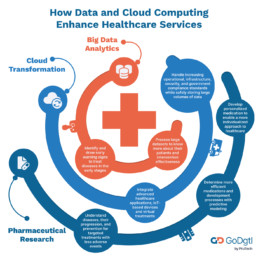The digital revolution in healthcare is faster than ever, making public health all the more inclusive, efficient and sustainable. Healthcare organizations are embracing new, data-centric technologies to handle the constant strain on global healthcare systems due to several factors. Healthcare data amounts to almost 30% of the world’s total data volume, while the compound annual growth rate of healthcare data is projected to reach 36% by 2025. That’s 10% more than financial services, 6% higher than manufacturing and 11% faster than media & entertainment.
Data-driven healthcare and cloud solutions are helping healthcare professionals lower costs, provide better care and improve satisfaction. These technologies make it easier for hospitals to align business outcomes with patient outcomes by stimulating processes as well as operational efficiency. Life Sciences and pharmaceuticals have previously relied on experimental observation and costly clinical trials. Recent developments in data sciences have allowed researchers to streamline complex studies. With increasing bandwidth, networking capabilities, and processing power, healthcare information systems are improving with no end in sight. Read more to find out how data and cloud services have increased the scope of impact that quality healthcare has on our lives.
How Data and Cloud Computing Enhance Healthcare Services
Big Data Analytics
Big data is massive amounts of information generated from different sources, stored and analyzed to derive a simpler, more practical truth from the larger picture. Big data has been previously associated with supercomputers, nuclear physics and defense simulations.
Cloud-based solutions like Microsoft Azure can process datasets that are otherwise too large or complex for traditional database systems. As a result, this derivation serves as meaningful information for researchers, patients, doctors, and administrators. For example, healthcare organizations can leverage big data to predict and prepare for a future health crisis.
Big data allows healthcare professionals to drill down and know more about their patients and the effectiveness of the care they provide. Since doctors can identify and draw early warning signs, it becomes possible for them to treat diseases in the early stages. In addition, hospitals can use underutilized health records by merging data from clinics, other healthcare institutes and public health records.
Cloud Transformation
Organizations with bigger employee populations are turning to cloud healthcare solution providers to enable more affordable yet high-quality healthcare services. Cloud provides them with the flexibility, scalability and security needed to keep up with the exponential medical and digital technology advancements.
Leading healthcare organizations have already initiated value-generating cloud transformations that bring various benefits to practitioners and patients alike. Cloud-based solutions help healthcare professionals deal with the ever-increasing operational and infrastructural costs, government compliances, and security concerns. With remote storage, hospitals can access a network of servers where they can safely store large volumes of data.
Cloud offers the amount of interoperability required for advanced healthcare applications such as collaborative patient care, IoT-based devices and quality virtual treatments. For instance, Google Cloud Platform’s (GCP) healthcare data engine makes data immediately useful by providing an interoperable, longitudinal patient data record.
Pharmaceuticals and Research
Data analytics can ensure that the right patient has the right medicine at the right time. Pharmaceutical and research organizations can utilize data to understand diseases better, their progression and prevention and create safer, targeted treatments with minimal adverse events.
Predictive modeling enabled by large datasets can help determine more efficient medications and development processes. More accurate therapy trials with medicines for specific categories of the population or individuals are possible through advanced statistical analysis and better study designs. Big data applied in biomedical research can help us gain novel insights on a granular scale.
This can help with developments in personalized medication and enable a more individualized approach to healthcare. Leading industries in biomedical sciences have leveraged Amazon Web Services (AWS) cloud platform for almost a decade to do more with their data.
Transform to Digital to Let Data Transform You
Today, digital transformation is not merely adopting a bunch of feature-rich software and getting your data online. There are several digital technologies and cloud-based applications to choose from. However, businesses need to go by a proven methodology and incorporate only the right solutions to reach the highest level of efficiency.
GoDgtl has partnered with the industry’s leading cloud platforms to provide healthcare organizations with the full benefits of the modern data landscape. We can help you evaluate the most suitable cloud platform and set up optimal agile processes along with robust security measures across the enterprise.
Recent Posts

April, 2022
